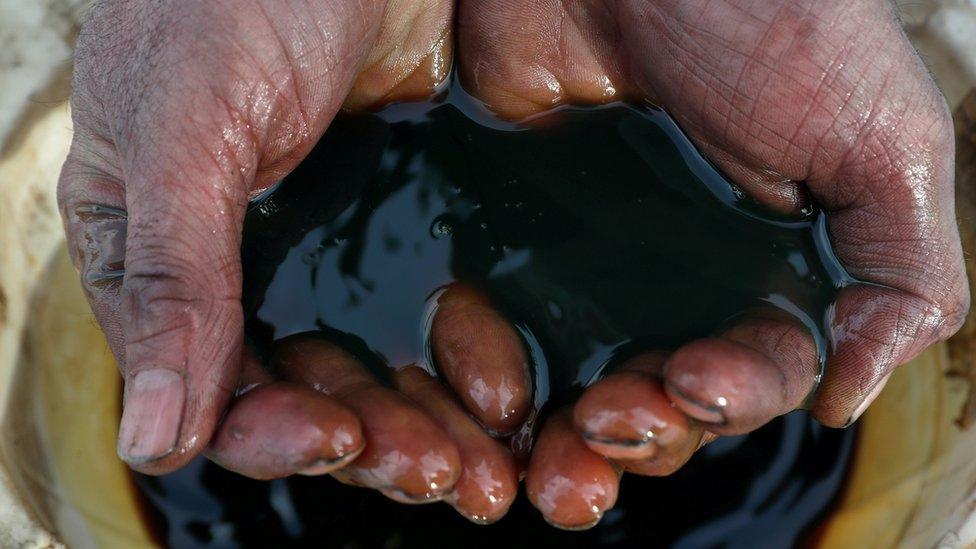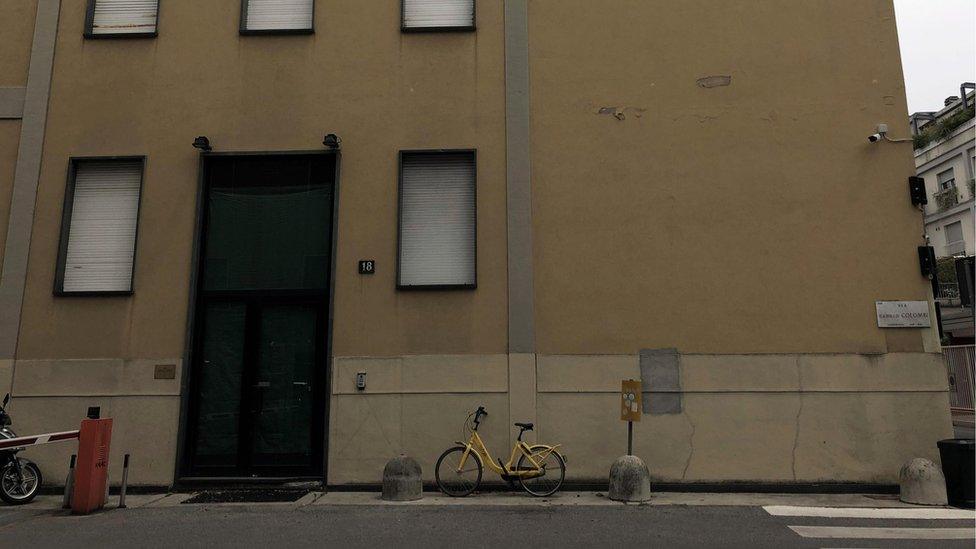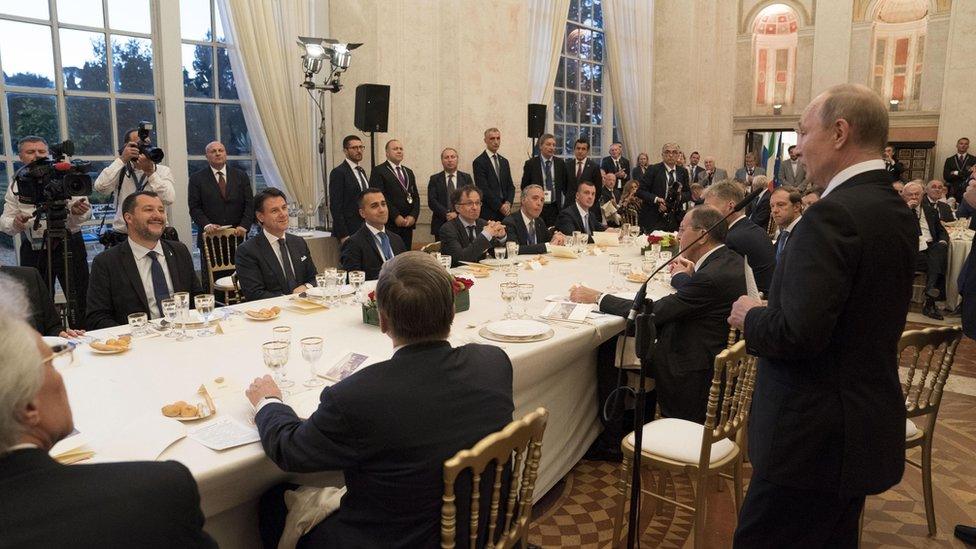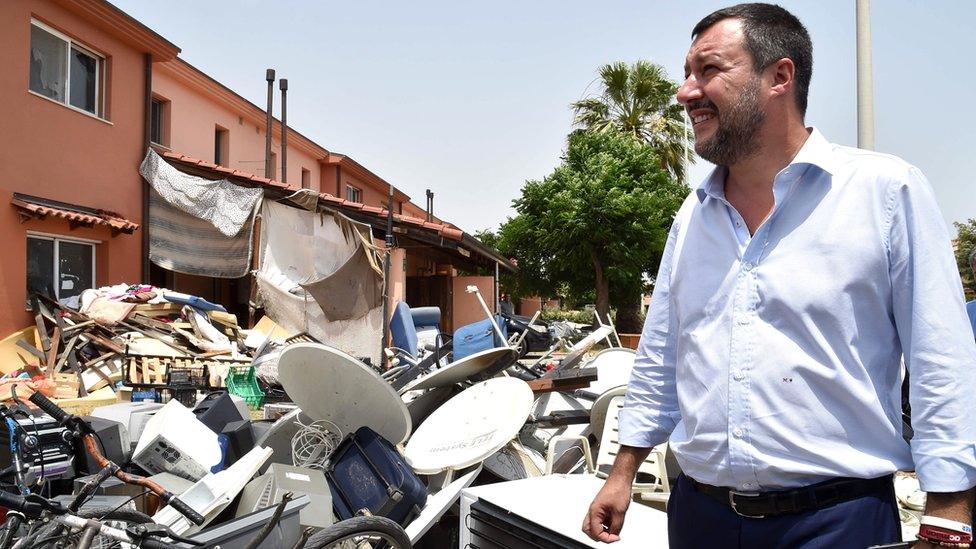Italy's League: Russian oil allegations grip Salvini's party
- Published

A Russian worker shows a sample of crude oil (file photo)
Corruption allegations are threatening to engulf the party of Matteo Salvini, the populist Italian interior minister whose Euroscepticism and hard line against illegal immigration have made him one of Europe's best-known politicians.
He is under pressure to address the Senate after prosecutors reportedly began investigating links between his nationalist League party and Russian businessmen.
While he rejects the corruption claims as "fantasies", they raise new suspicions of Russian money being used to buy influence in the West, in an effort to reverse sanctions imposed since Russia's annexation of Crimea in March 2014.
What are the allegations?
Milan prosecutors opened a preliminary investigation, said to be for international corruption, after journalists alleged a secret meeting had been held at a Moscow hotel on 18 October 2018 between three Italians and three unidentified Russians.
The Italians present at the meeting have been identified as:
Gianluca Savoini, a former spokesman for Mr Salvini
Business lawyer Gianluca Meranda
Financial consultant Francesco Vannucci
According to l'Espresso, which broke the story on 21 February, external, the men allegedly discussed an oil deal through which the League would receive payments worth millions of euros.
A Russian oil company would sell fuel to Italian energy company Eni at a discount through intermediaries, according to a transcript of an audio recording of the meeting, external published later by Buzzfeed.
The discount, worth around $65m (£52m; €58m) by Buzzfeed's calculation, external, would be secretly channelled to the League while the unidentified Russians apparently stood to make millions of dollars for themselves, the website reports.
A man identified as Mr Savoini is quoted in the transcript as telling the other Italians present that they and he must act as a "triumvirate" (a group of three equals wielding power together).
"You, me, represent the total connection for both the Italian and their 'political side' [sic]," he is reported as saying.
Eni says the deal never happened and strongly reiterates that it does not engage "in transactions aimed at financing political parties".
How do the Italians explain the meeting?
Mr Savoini was called in for questioning but invoked his right to remain silent, Italian media report.
However, he insisted on his innocence in an interview with La Stampa newspaper on 11 July. He had attended the meeting, he said, but had understood "nothing at all" of the business discussions, and had been in Russia to discuss cultural exchanges.
He said he had met the other people at the talks "a few hours before" at a business conference.

Mr Savoini heads the Lombardy-Russia association, which is based in this League building in Milan
"They recognised me in the hotel lobby and we started talking," he said. "If we had had anything really confidential to discuss, do you really think we would have stayed in the lobby?"
Before being questioned in turn, Mr Meranda wrote to another Italian newspaper, La Repubblica, external, to confirm he had also attended the meeting but as "general counsel of an English-German investment bank... interested in purchasing Russian oil products".
He insisted he had "never dealt with political party funding".
Police searched documents belonging to Mr Vannucci after he came forward, Italian media report.
Who is Gianluca Savoini?
He has known Mr Salvini 25 years and has been a member of the League since the early 1990s, he has told La Stampa.
He also describes himself on his Twitter profile as a journalist and expert in geopolitics who heads the Lombardy-Russia Association, which presents itself as a non-party cultural association that identifies with the values of President Vladimir Putin, external.

Vladimir Putin (standing) met Italian leaders including Mr Salvini (bearded) in Rome this month
On several occasions, he has accompanied Mr Salvini on visits to Russia. He told La Stampa he had had "no mandate to negotiate anything whatsoever on the League's behalf".
But the League's leader seems to be distancing himself from him.
On 4 July, Mr Savoini tweeted a video clip of Mr Putin at a government reception in Rome, external attended by Mr Salvini and other Italian leaders, saying it had been a "great pleasure" to be there.
A clearly exasperated Mr Salvini said later that Mr Savoini had not been invited by his ministry.
What impact is this having on Salvini?
The interior minister, who is also deputy prime minister in Italy's ruling coalition, has never made any secret of his own admiration for Mr Putin but denies ever taking "a rouble, a euro, a dollar, or a litre of vodka in Russian funding" for himself or his party.
After Mr Salvini's League came top in European elections in Italy, he announced "Europe is changing"
He was also in Moscow at the time of the hotel meeting but there is no suggestion he was involved in the discussions.
However, he is under mounting political pressure over the affair that Italian media have dubbed "Russiagate" (a play on "Watergate) or "Moscopoli" (a play on Tangentopoli, the bribery scandal that rocked Italian politics in the 1990s).
His year-old populist coalition with the Five Star Movement was already trouble, even before the allegations arose.
And last year an electoral payments scandal landed the League with a court order to repay the state €49m.
Is Moscow trying to buy political influence?
The Kremlin has denied offering money to any Italian politicians "either directly or from some sort of deals".
While there is no proof the Kremlin covertly funds political allies in the West, France's far-right Front National in France legally took out Russian loans worth €11m (£9.4m) in 2014.
Earlier this year, the head of Austria's far-right Freedom Party, Heinz-Christian Strache, resigned as vice-chancellor after being caught on camera discussing a deal to offer public contracts to what he thought was a Russian investor in return for the investor buying a stake in an Austrian newspaper.
Meanwhile, Italy proceeds with its preliminary investigation, overseen by a veteran anti-corruption prosecutor.
If anyone can get to the bottom of what happened in Moscow last October, it's probably Fabio De Pasquale, whose previous corruption investigations led to the conviction of two Italian prime ministers, Bettino Craxi in 1994 and Silvio Berlusconi in 2012.
- Published9 July 2019
